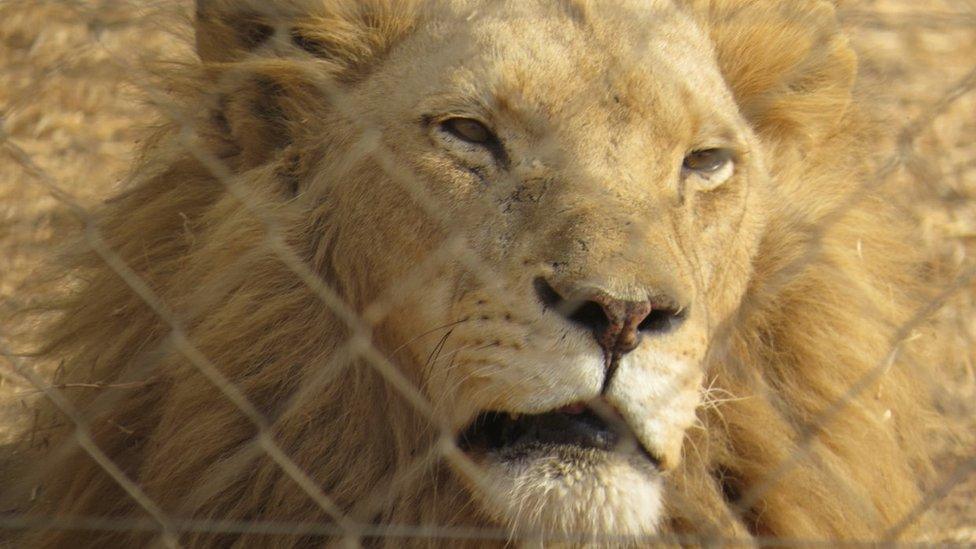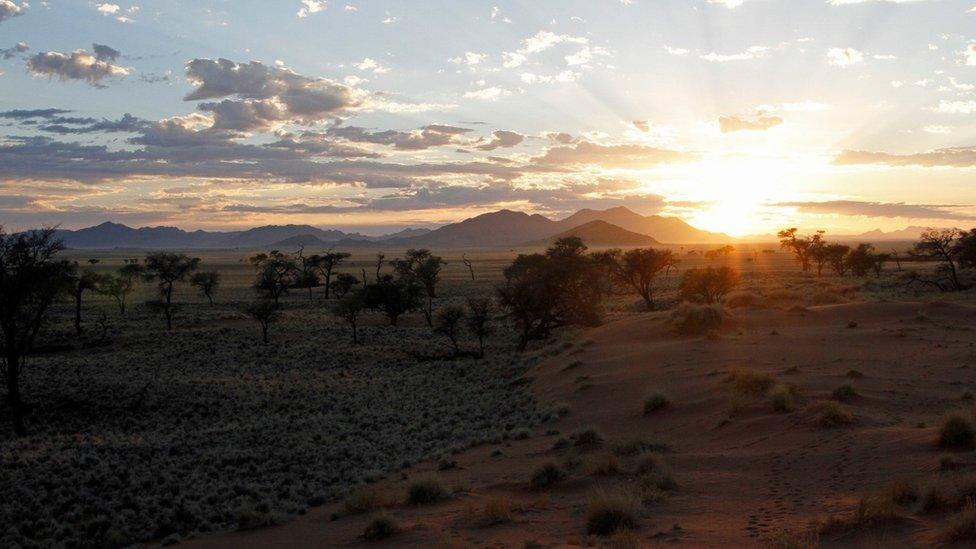Viewpoint: Uncomfortable realities of big game hunting
- Published

For those who are so inclined, it is possible to legally hunt virtually any African animal
Trophy hunting has been the subject of much media attention amid the backdrop of declining populations of big game animals in Africa. But is a blanket ban really the answer?
At the end of June 2015, a Zimbabwe lion known as Cecil was wounded by a crossbow bolt shot by American dentist Walter Palmer.
Sometime later Cecil was shot and finally killed.
The media attention that followed made it clear that many people were unaware of the realities of modern-day African hunting.
In fact, if you have enough money and are so inclined, you can legally hunt pretty much any African animal, including lion, leopard, elephant, buffalo and hippo.
You'll need the right permits and it's subject to quotas and regulations but if you do it by the book, then it's perfectly legal. And once you've killed it you can export the "trophy" home.
'Moral objection'
Following Cecil's death, many have called for a blanket ban on trophy hunting. Calls for a ban come from a number of different directions.
For some, there is a moral objection to the killing of animals for pleasure, for others an understandable emotional response to images of hunters posing with their kills or concerns over conservation.
But calls for a blanket ban on trophy hunting fail to take into account the complex relationship between hunting and conservation.
Some trophy kills are hard to justify no matter which side of the fence you sit on. Leopard for example are a CITES (Convention on International Trade in Endangered Species of Wild Fauna and Flora) Appendix I species.

As the human population in Africa expands, conflict between humans and wildlife increases
Such species are threatened with extinction and the commercial trade in wild-caught specimens is illegal. Despite this, it is still possible to hunt one "on trophy" (subject to quotas) for personal, non -commercial purposes.
Another hunting practice that has come under the spotlight is "canned hunting" of lions. There is considerable confusion between, and conflation of, trophy hunting and canned hunting. Canned hunting, where captive bred lions are released into small enclosures to be hunted in a "no kill no fee" arrangement, "hits the bottom of the barrel" according to Will Travers, President of wildlife charity the Born Free Foundation.
Poor welfare
Largely based in South Africa, the welfare issues involved in canned hunting, which include severe over-crowding and inadequate access to food and water, have recently been exposed by environmental film maker Ian Michler in his film Blood Lions.
However, as lion conservation expert and author of Lions in the Balance: Man-eaters, Manes and Men with Guns, Professor Craig Packer, says: "These animals are not part of the wild population and so, there's no real immediate impact on conservation… I view canned hunting mostly as an animal welfare issue."
Many sought-after trophy animals, such as kudu and impala, are maintained in large numbers across Southern Africa, especially South Africa, within large, fenced, privately-owned reserves.

Many prized trophy animals such as kudu are maintained in large, fenced reserves
Animal numbers need to be controlled to prevent over-stocking and over-grazing. Surplus animals are harvested for meat but larger males can generate far more revenue if they're taken by a trophy hunter.
The taking of trophy animals in such reserves is of limited conservation concern and the money generated helps to pay for the management that is required to keep reserves in good condition.
In fact, the impact of trophy hunting depends on the species and the region being considered. So the past few decades in South Africa have seen a landscape-level replacement of cattle farming with wildlife farming.
As a consequence: "Southern Africa's seen large scale recoveries of wildlife in the 20th century, built around hunting," says Rosie Cooney, who heads the IUCN Sustainable Use and Livelihoods Specialist Group.
Trophy hunting of many species was, and continues to be, vital in funding this reversal and a blanket ban there is neither needed nor desirable.
It pays, it stays?
This "consumptive utilisation of wildlife" model ("it pays it stays") also works well in some other regions. The Bubye Valley Conservancy in Zimbabwe for example has more than 400 lions and one of the most important populations of rhino still in existence.
The Conservancy is funded entirely by hunting and, according to the reserve manager Blondie Leathem, a ban would be "devastating".
However, trophy hunting is not always beneficial for wildlife. Over-harvesting can clearly have a detrimental effect on numbers.
Also, trophy hunters select large males and this can have more profound effects on the breeding dynamics of animals in that region. These problems are greatest when land is not stably owned and a "tragedy of the commons" (when everyone harvests as much as they can for short-term gain) can result.
It is tempting to suggest that hunting could be replaced by tourism and in some places this is indeed the case. However, as Rosie Cooney points out, tourism is only possible in regions that "are accessible…a few hours generally from a major hub…with good roads".
They also need to be safe, "lacking in dangerous diseases….and politically stable". There needs to be the infrastructure to look after tourists and you need capital to invest in it. Many hunting concessions operate successfully in areas where none of these conditions are in place, at least for now.
The pro-hunting argument is simple. Hunting provides revenue that directly funds conservation. Anti-hunters often claim that this hunting-conservation link doesn't stand up to scrutiny. The problem in deciding whether hunting is beneficial or not is that both sides are right.
How can both sides be right? The answer to that lies in the fact that Africa is not a single entity.
Different countries and even regions within those countries have different histories, geography, politics, governance, infrastructure, economics, population demographics and tribal politics. In some regions hunting is vital for conservation. In such regions "it pays it stays" works and a ban would be detrimental to wildlife.
In other regions, hunting could be replaced or at least supplemented by tourism. In still other regions, and certainly for some species, a ban on hunting could be a sensible move for conservation. A "one size fits all" solution is not what is required.
Last wilderness
In fact, Prof Craig Packer says that across Africa overall "neither trophy hunting nor phototourism is sufficient to cover the costs [of conservation]".
Whilst these activities can and do work in some places, he thinks that "we need to move away from the standard model of wildlife conservation in Africa, which has always been 'wildlife must pay its own way'". Overall, the approach doesn't generate enough money and consequently, "we're seeing dramatic losses of wildlife numbers throughout a lot of Africa."
It is interesting that the killing of a single lion by a wealthy, white, American attracted so much attention.
As Will Travers explains: "I don't think we should fool ourselves that it's all about trophy hunting. Lions are threatened by habitat loss, habitat fragmentation…human activities that disperse and displace lions [and] the loss of prey species."
There are few true wildernesses left, and as the human population in Africa expands, conflict between humans and wildlife gets ever greater. Far more lions are killed by cattle herders defending their livestock and their families than by trophy hunters. Don't forget, in the UK, we long ago killed our apex predators so that we could sleep soundly.
To conserve wildlife we need to find ways to protect animals from people and people from animals. We also need to find ways to ensure animal populations are more valuable alive in the long-term (even if that means sustainable harvesting) than dead in the short-term.
Conservation is an extraordinarily complex problem but it is also one of the most significant problems we now face. The solution will not be found in knee-jerk responses driven by emotion and fuelled by social media.
Prof Adam Hart is professor of science communication at the University of Gloucestershire. He presents Big Game Theory on BBC Radio 4 at 20:00 on Tuesday 1 September.